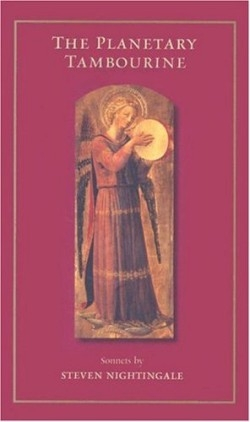The Planetary Tambourine
What poetic form has proven more resilient and adaptable than the sonnet? The author’s fourth book—and second collection of sonnets—demonstrates that much remains to be done within the familiar confines of fourteen lines of iambic pentameter. While some recent sonneteers have stretched and bent the form almost beyond recognition, Nightingale is pleased to work rather close to the tradition, and nearly all of these poems are quite regular in their rhyme schemes (usually English) and metrics.
Often the poems take up traditional subjects as well: love, the seasons, the sonnet itself. The subject of poems has always been much less important than their execution, however, and Nightingale has the right hands for this work. Consider the string of adjectives at the end of this love sonnet, at once graceful and inventive: “Our bodies brushed smooth by a wonderment / More than hope, loss, peace and waking— / Mindful, dangerous, trustworthy lovemaking.” Or this brace of questions from “Meeting You Early in the Evening,” and the skillful changes they ring on conventional imagery of light and darkness: “Did you see how twilight was searching the sky? / Did you see how the starlight that you bring / Searches for my knot of darkness to untie?”
Nightingale’s language is his own, even when he takes up a subject like “Simple Day-to-Day Work.” Frost famously praised such work in “Mowing” (“The fact is the sweetest dream that labor knows”), but Nightingale asks readers to “know the work not yours,” not merely human work, but that “done on ocean floors” and “planned by / Sunflowers and ideas of sea-birds.” Like many of his poems, this one achieves stretches across wide ranges of space and thought within its few lines.
Sometimes the imaginative reach is metaphysical, even religious. “What if Transfiguration is Just Part of the Gig?” takes risks even more outrageous than its hefty title in its call for attentiveness to the physical world and change in response: “May the metropolis learn, / by grace of a heaven / Lighting the wick of the river.” Very few poets could get away with the word that Nightingale coins in the concluding line, but he at least comes very close: “The sand / Bears a legend, because you learned to see / By fantastication of heart, sunlight’s surety.”
“Make it new,” said Ezra Pound, famously; yet he recognized and helped to promote the rather traditionalist innovations of Robert Frost. The new lies everywhere, within and without, suggests Nightingale, and the old ways of paying attention to it are still available to a poet who can use them rightly.
Reviewed by
Jeff Gundy
Disclosure: This article is not an endorsement, but a review. The publisher of this book provided free copies of the book to have their book reviewed by a professional reviewer. No fee was paid by the publisher for this review. Foreword Reviews only recommends books that we love. Foreword Magazine, Inc. is disclosing this in accordance with the Federal Trade Commission’s 16 CFR, Part 255.

